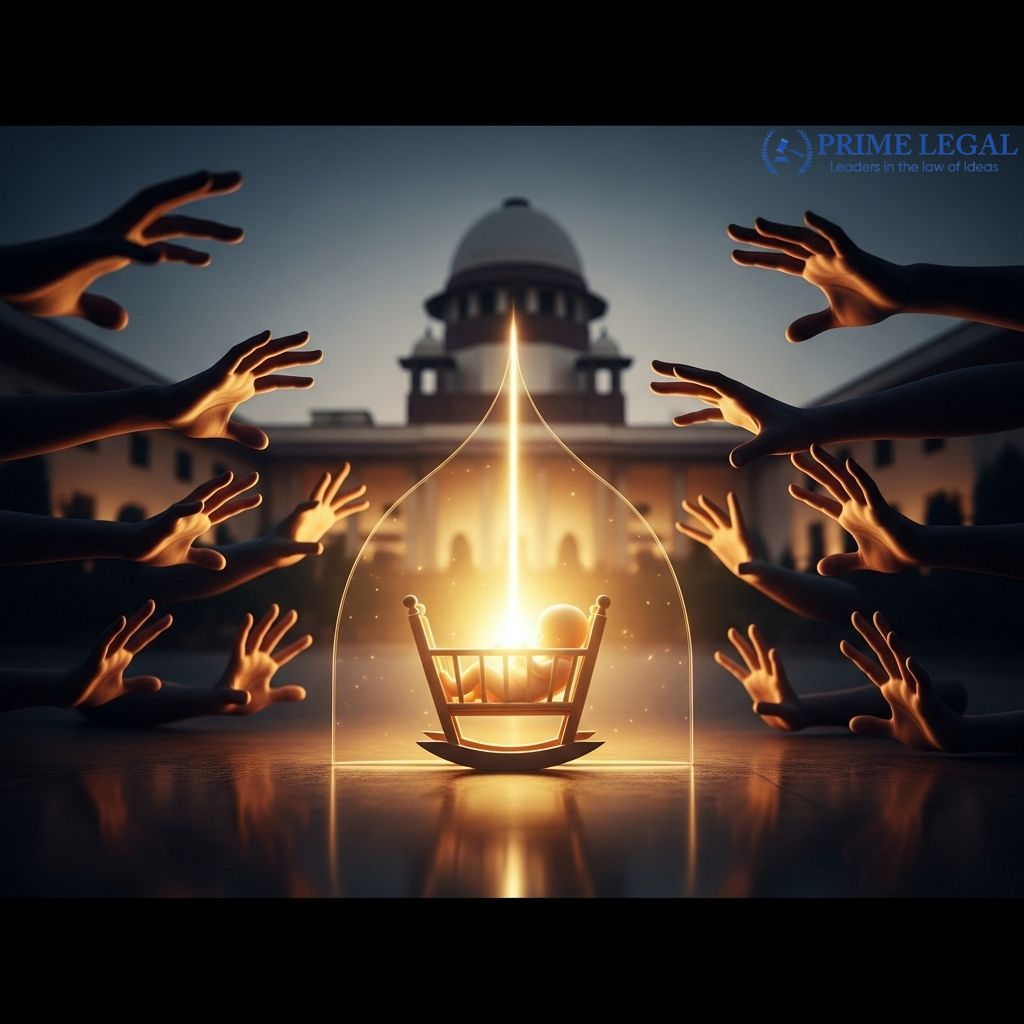Facts
Three couples approached the Supreme Court, challenging their disqualification from availing surrogacy due to age restrictions under Section 4(iii)(c)(I) of the Surrogacy Regulation Act, 2021. All couples had commenced the surrogacy process (fertilisation of gametes and freezing of embryos) before the Act’s enforcement (25.01.2022), but the actual embryo transfer and related steps were delayed by external factors such as the COVID-19 pandemic. With the coming into force of the Surrogacy Act and the corresponding Rules, both the women (over 50 years) and the men (over 55 years) exceeded the new statutory age threshold for intending parents. The intended couples are placing forth the fact that they were already making progress in the surrogacy process before the law even commenced which declared the age restriction. In addition to this, the appealing couples have also condemned the retrospective application.
Issues
Whether the age restrictions mentioned under Section 4(iii)(c)(I) of the Surrogacy Regulation Act, 2021, apply retrospectively to couples who had already commenced the surrogacy process before the commencement of the act?
Whether the petitioners, who had completed the process of fertilisation and embryo freezing before 25.01.2022, retain any vested right to continue the surrogacy process even if they cross the age bar after the Act’s commencement.
Whether the right to procreation and surrogacy is a facet of reproductive autonomy under Article 21, allowing such couples to proceed unfettered by the new age limits.
Legal Provisions
Section 4(iii)(c)(I) Surrogacy Regulation Act, 2021: Requires that an eligibility certificate for surrogacy is issued only if the female is between 23-50 and the male between 26-55 at certification.
Section 53 Surrogacy Regulation Act, 2021: This Section provides a transitional period for surrogate mothers but not for intending couples.
Article 21 Constitution of India: The most important article, Protection of life and personal liberty, including reproductive autonomy as interpreted in Supreme Court jurisprudence
Arguments
Petitioners
The Petitioners are contending that the Act cannot bar couples retrospectively, especially where embryo creation and freezing occurred before the age limit was notified. They further contended that Reproductive choice (including the use of surrogacy) is an aspect of Article 21. They submit that there was no bar on the age declared before the date of 25th January, 2022 so they hold the contention that their vested rights accrue.
Respondents
The Union of India, submits that The Act and age bar are implemented to protect the best interests of the surrogate child and mother. They submit that Surrogacy is not a fundamental right but a statutory right, which to be regulated as per the legislative framework. They submit that there is no saving clause for intending couples, only for surrogate mothers under Section 53, and the law intends to apply the age criterion at the certificate stage.
Analysis
Before 2022, no law barred intending couples above a certain age from availing surrogacy, only the National Guidelines only prescribed age for donors, not commissioning parents. The petitioners completed all necessary steps for surrogacy (creation and freezing of embryos) prior to the Act coming into force, and their intention to proceed was clear. The new legislative age bar, if applied retrospectively, would frustrate vested rights exercised lawfully under the old regime. The Supreme Court held that the right to surrogacy, once exercised consistent with the law, could not be destroyed by subsequent legislation unless there was an explicit or inevitably necessary intention in the statute. The rule against retrospectivity, rooted in fairness, supports prospective application unless Parliament clearly provides otherwise.
Judgment
The petitioners completed all necessary steps for surrogacy (creation and freezing of embryos) prior to the Act coming into force, and their intention to proceed was clear. It was held that the new age bar set by the act, if it is applied retrospectively then it would vitiate all the rights that were exercised lawfully before. The Supreme Court held that the right to surrogacy, if it is being exercised in accordance with law, should and could not be destroyed by any subsequent legislation unless there was explicit or inevitable intention in the statute. It was held further that the rule against retrospectivity stems from fairness and it supports prospective application unless parliament clearly provides.
Conclusion
Therefore, the Supreme Court has clarified on the issues and protected the right of the Intending couples because they had already initiated the surrogacy process before the Act set the age limit. This Act can only be applied prospectively and it clarified that applying the age bar retrospectively would unjustly infringe upon personal liberty and the constitutional right to reproductive autonomy.
Click here to read more: Vijaya Kumari S & Another v. Union of India with Urvashi & Another v. Union of India
“PRIME LEGAL is a full-service law firm that has won a National Award and has more than 20 years of experience in an array of sectors and practice areas. Prime legal falls into the category of best law firm, best lawyer, best family lawyer, best divorce lawyer, best divorce law firm, best criminal lawyer, best criminal law firm, best consumer lawyer, best civil lawyer.”
WRITTEN BY S. KAVIYA SRI


